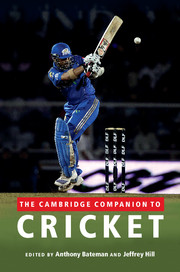Book contents
- Frontmatter
- Introduction
- 1 Cricket pastoral and Englishness
- 2 Cricket in the eighteenth century
- 3 Corruption in cricket
- 4 Broadcasting and cricket in England
- 5 Bodyline, Jardine and masculinity
- 6 Don Bradman: just a boy from Bowral
- 7 The Packer cricket war
- 8 New Zealand cricket and the colonial relationship
- 9 C. L. R. James and cricket
- 10 Reading Brian Lara and the traditions of Caribbean cricket poetry
- 11 The detachment of West Indies cricket from the nationalist scaffold
- 12 The Indian Premier League and world cricket
- 13 Hero, celebrity and icon: Sachin Tendulkar and Indian public culture
- 14 Conflicting loyalties: nationalism and religion in India–Pakistan cricket relations
- 15 Cricket and representations of beauty: Newlands Cricket Ground and the roots of apartheid in South African cricket
- 16 Writing the modern game
- 17 Cricket and international politics
- Further reading
- Index
6 - Don Bradman: just a boy from Bowral
Published online by Cambridge University Press: 28 September 2012
- Frontmatter
- Introduction
- 1 Cricket pastoral and Englishness
- 2 Cricket in the eighteenth century
- 3 Corruption in cricket
- 4 Broadcasting and cricket in England
- 5 Bodyline, Jardine and masculinity
- 6 Don Bradman: just a boy from Bowral
- 7 The Packer cricket war
- 8 New Zealand cricket and the colonial relationship
- 9 C. L. R. James and cricket
- 10 Reading Brian Lara and the traditions of Caribbean cricket poetry
- 11 The detachment of West Indies cricket from the nationalist scaffold
- 12 The Indian Premier League and world cricket
- 13 Hero, celebrity and icon: Sachin Tendulkar and Indian public culture
- 14 Conflicting loyalties: nationalism and religion in India–Pakistan cricket relations
- 15 Cricket and representations of beauty: Newlands Cricket Ground and the roots of apartheid in South African cricket
- 16 Writing the modern game
- 17 Cricket and international politics
- Further reading
- Index
Summary
On 27 February 2001, Australia's greatest cricketer, Sir Donald Bradman, died in Adelaide aged ninety-two. Tributes flooded in from around Australia and the world, including one from the Australian Prime Minister, John Howard, who lamented the passing of ‘the quintessential Australian hero’. Howard considered Bradman an Australian ‘battler’ who had risen above his humble origins by hard work and exceptional talent to inspire the nation by his cricketing deeds. Howard often compared Bradman's inspirational qualities to those of the Australian and New Zealand Army Corps (ANZAC) during the Great War. Like them, Bradman's batting feats during the Depression ‘reinforced the national spirit … and helped to display the independence and self-reliance of a young nation barely decades old’. His record-breaking efforts proved ‘that Australians were capable of being a talented and resourceful people’. In muddling his ANZAC and sporting myths, Howard neglected to mention that Bradman's own military service during the Second World War was brief and plagued by ill-health. But Howard deliberately politicised Bradman's life, elevating him to the status of national hero. Curiously, little is known of Bradman's private life, and whether he was worthy of such elevation. Perhaps he was just a boy from Bowral who was blessed with rare cricketing ability and little else.
- Type
- Chapter
- Information
- The Cambridge Companion to Cricket , pp. 85 - 99Publisher: Cambridge University PressPrint publication year: 2011
- 1
- Cited by

